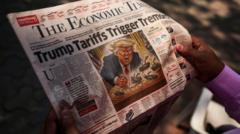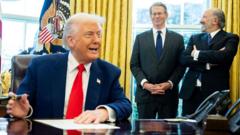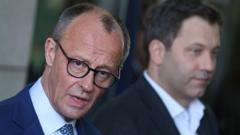Following the dissolution of Chancellor Scholz's coalition, Germany will hold a snap election on February 23. Both ruling and opposition parties gear up for a robust campaign, focusing on economic recovery and political stability.
German Snap Election Set for February 23 Amid Coalition Crisis

German Snap Election Set for February 23 Amid Coalition Crisis
Chancellor Olaf Scholz's coalition collapse prompts early voting; campaign intensifies.
In a historic political shift, German lawmakers have confirmed a snap election for February 23, following the recent collapse of Chancellor Olaf Scholz’s coalition government. This decision comes approximately seven months earlier than the previously scheduled elections, which now leaves Germany in a political frenzy as all parties gear up for intense campaigning.
The coalition, which included Scholz's Social Democratic Party (SPD), the pro-business Free Democratic Party (FDP), and the Greens, fell apart last week over disputes related to the 2025 budget. In a dramatic turn of events, Scholz opted to dismiss his finance minister, Christian Lindner, a move that ultimately dissolved the fragile alliance and sent shockwaves throughout the German political landscape.
Leading up to this decision, Scholz had hinted at elections being postponed until March, but mounting pressure from the conservative opposition, specifically the Christian Democratic Union (CDU), propelled lawmakers to finalize a quicker election date. The CDU argued that Scholz, now in a minority government position, would be hindered in his ability to enact new laws or address crucial national issues in the months leading up to elections, making an earlier vote essential.
As political leaders across parties brace for a campaign period, they will be tasked with addressing urgent concerns regarding Germany's economic recovery from recent downturns, alongside the implications of former President Donald J. Trump’s anticipated return to the political fray in the U.S. On Sunday, in his first public address since the coalition's collapse, Scholz reaffirmed his intentions to pursue a second term, signaling his commitment to lead the SPD in the upcoming electoral battle.
With the nation's future hanging in the balance, the February election promises to be a defining moment for Germany's political trajectory.






















